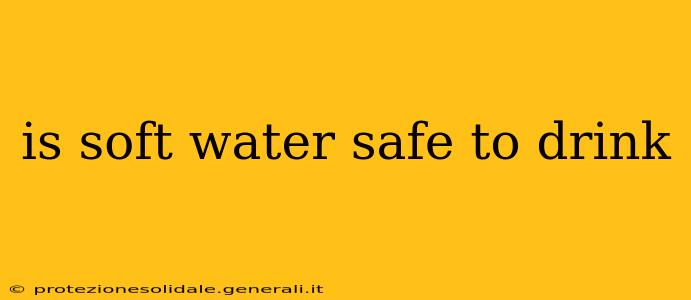Soft water, often lauded for its benefits in protecting plumbing and appliances from limescale buildup, frequently sparks the question: Is soft water safe to drink? The short answer is generally yes, but it's crucial to understand the nuances. This comprehensive guide delves into the safety of drinking soft water, addressing common concerns and providing you with the knowledge to make an informed decision.
What Makes Water "Soft"?
Before discussing the safety of drinking soft water, let's clarify what makes water "soft" in the first place. Hard water contains high levels of dissolved minerals, primarily calcium and magnesium. These minerals are naturally occurring and generally harmless. Soft water, on the other hand, has had these minerals removed through a softening process, typically ion exchange. This process replaces calcium and magnesium ions with sodium ions.
Is the Sodium in Soft Water Harmful?
This leads to the primary concern regarding the safety of drinking soft water: the increased sodium content. High sodium intake is linked to various health issues, including high blood pressure. However, the sodium levels in softened water are usually far below the levels found in processed foods and salty snacks. For most people, the extra sodium from drinking softened water poses minimal risk. Individuals on low-sodium diets, however, should be mindful and perhaps consider alternative water sources or consult their doctor.
Are There Other Potential Concerns?
While the increased sodium is the main concern, other potential issues exist, though they're relatively rare:
- Increased Lead Exposure (In Older Plumbing): Soft water can sometimes corrode lead pipes, potentially leaching lead into the water supply. This is a serious health concern, and it's essential to ensure your plumbing is lead-free, particularly if your home is older. Regular water testing can help identify any lead contamination.
- Changes in Taste and Smell: Some people find the taste and smell of soft water to be different from hard water. This is a matter of personal preference and doesn't necessarily indicate any health risks.
What About Different Softening Methods?
The method of water softening can influence the final product's safety. Ion exchange is the most common method, but other methods exist. It is important to understand the specific method used to soften your water to better assess its safety. Always consult with the provider of your water softening system for information on the process and any potential concerns.
How Can I Ensure My Soft Water is Safe?
The best way to ensure your soft water is safe to drink is through regular testing. This testing should include checking for sodium levels, lead, and other potential contaminants. Local water authorities or private laboratories can perform such tests. Regularly maintaining your water softener is also crucial to prevent potential issues.
Does Soft Water Affect Taste and Odor?
Many find that soft water tastes slightly different than hard water, often describing it as more bland or lacking the "mineral" taste. This is simply a matter of preference; there is no evidence suggesting it poses any health risks.
Can I Still Drink Soft Water if I Have High Blood Pressure?
If you have high blood pressure or are on a low-sodium diet, you should discuss your soft water consumption with your doctor. They can assess your individual risk factors and provide recommendations tailored to your health needs. Monitoring sodium intake remains crucial.
What are the Alternatives to Soft Water?
If you're concerned about the potential effects of soft water, several alternatives exist. Bottled water provides a convenient option but can be more expensive and environmentally impactful. Installing a reverse osmosis system can remove impurities and excess minerals but may also remove beneficial minerals.
Conclusion
In conclusion, soft water is generally safe to drink for most people. However, awareness of potential issues like increased sodium and lead leaching is vital. Regular water testing, maintenance of your water softener, and consultation with your doctor, especially if you have pre-existing health conditions, are recommended to ensure the safety and suitability of your soft water supply. Remember that individual needs and sensitivities can vary. Prioritize open communication with healthcare providers and water professionals to make informed decisions about your water consumption.
